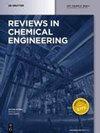用辅助技术和天然深共晶溶剂萃取酚类化合物
IF 6.6
3区 工程技术
Q1 ENGINEERING, CHEMICAL
引用次数: 4
摘要
酚类化合物具有抗炎作用,对人体防御系统有重要作用。这可以减缓衰老过程,增强人体免疫系统。随着人们对绿色化学概念的兴趣日益浓厚,从植物中提取酚类化合物已朝着使用绿色环保溶剂(如天然深共晶溶剂(NADES))的可持续发展方向发展。本文综述了酚类化合物的传统提取方法和先进的NADES提取方法,重点介绍了微波辅助提取(MAE)和超声辅助提取(UAE)技术,并对它们进行了基本比较。基于氯胆碱的天然深共晶溶剂(NADES)由于其生物降解性和萃取机理而成为绿色溶剂萃取酚类化合物的一种很有前途的方法。本文还讨论了利用NADES的辅助提取技术,以便更好地了解它们与提取效率的关系。此外,本文还概述了从NADES中提取酚类化合物所面临的挑战、NADES的潜在危害以及未来的发展前景。本文章由计算机程序翻译,如有差异,请以英文原文为准。
Phenolic compounds extraction by assistive technologies and natural deep eutectic solvents
Abstract Phenolic compounds are known to have a significant effect on human defense system due to their anti-inflammatory efficacy. This can slow down the aging process and strengthen the human immune system. With the growing interest in green chemistry concept, extraction of phenolic compounds from plants has been geared towards a sustainable path with the use of green and environmentally friendly solvents such as natural deep eutectic solvents (NADES). This review discusses both the conventional extraction and the advanced extraction methods of phenolic compounds using NADES with focus on microwave-assisted extraction (MAE) and ultrasound-assisted extraction (UAE) techniques ensued by a rationale comparison between them. Employing choline chloride-based natural deep eutectic solvents (NADES) is highlighted as one of the promising strategies in green solvent extraction of phenolic compounds in terms of their biodegradability and extraction mechanism. The review also discusses assistive extraction technologies using NADES for a better understanding of their relationship with extraction efficiency. In addition, the review includes an overview of the challenges of recovering phenolic compounds from NADES after extraction, the potential harmful effects of NADES as well as their future perspective.
求助全文
通过发布文献求助,成功后即可免费获取论文全文。
去求助
来源期刊

Reviews in Chemical Engineering
工程技术-工程:化工
CiteScore
12.30
自引率
0.00%
发文量
37
审稿时长
6 months
期刊介绍:
Reviews in Chemical Engineering publishes authoritative review articles on all aspects of the broad field of chemical engineering and applied chemistry. Its aim is to develop new insights and understanding and to promote interest and research activity in chemical engineering, as well as the application of new developments in these areas. The bimonthly journal publishes peer-reviewed articles by leading chemical engineers, applied scientists and mathematicians. The broad interest today in solutions through chemistry to some of the world’s most challenging problems ensures that Reviews in Chemical Engineering will play a significant role in the growth of the field as a whole.
 求助内容:
求助内容: 应助结果提醒方式:
应助结果提醒方式:


